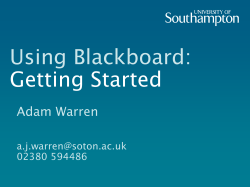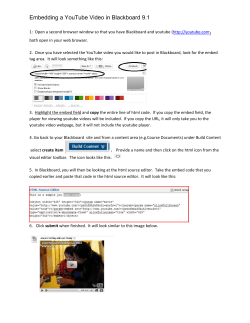
SPPH 526 (DL) - School of Population and Public Health
SPPH 526-DL2: Leadership in Public Health Winter 2014 Course Outline January-April 2015 January 24 (B104) February 27 (491) March 29 (B104) Time: 8:30 am - 4 pm Course Coordinator: Office: Telephone: Fax: Email: Teaching Assistant: Dr. Arminée Kazanjian, Professor School of Population and Public Health #275 - 2206 East Mall Vancouver, B.C. V6T 1Z3 604-822-4618 604-822-4994 Arminee.kazanjian@ubc.ca Sally Lin MPH Student Sally Lin <sally.yue.lin@gmail.com> Format of Instruction The course will incorporate cases, articles, discussions, guest speakers and student seminars to provide participants with insight into the roles, challenges, and success requirements of public health leaders. Description This course focuses on the leadership capabilities and skills that are most relevant in public health, for front-line workers, managers, and professionals. The HCLABC Leaders for Life framework is introduced and successive sessions take selected elements of the framework for further consideration and discussion. These include leadership skills such as selfawareness, teambuilding, crisis management, strategic thinking, evidence informed decision-making, and policy development. Course Objectives This course will provide the opportunity for students to: 1. Become familiar with leadership theories and concepts in the context of Public Health and in public health practice. 2. Develop an understanding of leadership behaviors and competencies pertinent to public health practice. SPPH 526 DL2, Course Outline, 2014-2015 © Arminée Kazanjian Page 1 3. Appraise own leadership abilities, demonstrate insight into own strengths in the context of current challenges facing Public Health 4. Learn how to engage others on various teams and networks, and build coalitions across organizations 5. Begin to develop leadership attributes to demonstrate transformational change in public health. Evaluation There will be several assignments for evaluating student progress: class presentation, a case study, and concept papers. The syllabus for the course includes papers from peer journals, selected chapters from Public Health Leadership: Putting Principles into Practice (by Louis Rowitz, 2nd edition) and key documents from the Leaders for Life Program (HCLABC). The framework documents will provide guidance on the broad set of capabilities that good leadership must create within Public Health that is consistent with the mandate and purpose of the BC health system. Students may chose to focus on one or more of the 5 attributes contained in the Framework. Requirements: The requirements and assignments for the course are as follows: 1. Class contribution. Come prepared to participate actively each month in on-line discussions and when in class, on campus. Clear instructions for this will be available on the course webpage (15% of course grade). 2. Case Study of selected topic for oral (seminar) presentation in March. This is a group assignment. Please read instructions on the course webpage. The seminar presentation should contain a set of questions that will generate class discussion (5% of course grade). The written version of the case study is due at the end of Term. (30% of course grade) 4. Critique of assigned Case Study, oral presentation in March. (15% of course grade) 5. Detailed statement of your values, vision, and unique capacity to contribute as a leader in Public Health. About 5-6 pages. Due mid-March . (35% of course grade) Schedule of Topics-On-line and Face to Face Date Instructor(s) Topic Module 1 January 8: 7-8pm Blackboard connect January 15: 7-8pm Blackboard Connect Dr. Arminée Kazanjian Orientation Sally Lin Course outline/overview Course structure & learning goals Overview of Leaders for Life leadership framework Public Health practice: Leadership in context LEADS Key points: A Checklist SPPH 526 DL2, Course Outline, 2014-2015 © Arminée Kazanjian LEADS Domains (5) LEADS capabilities (4) for each domain LEADS 360 Self-Assessment Tool Reflections on previous learning exercise Page 2 January 24: Face-to-face Guest Speakers Guest Speakers January 24: February 5: 7-8pm Blackboard Connect February 19: 7-8pm Blackboard Connect February 27 Face-To-Face Guest Speakers Module 3 March 5:7-8pm Blackboard Connect Ted Bruce, MA, Chair CIHR IPPH IAB (morning) Michelle Reid, MPH, Reseach Manager, Cancer Prevention Centre, UBC (afternoon) Module 2 Engaging Others and Engaging with Others The Charismatic, Innovative Leader’s Role in the Work Environment Dr. Arminée Kazanjian Organizational environments; from hierarchies to collaboratives Fostering the development of others; the role of goal setting, rewards & incentives, development opportunities and encouraging participation in decision-making Team building: Developing political & social intelligence Systems Transformation 1 - Knowledge Synthesis, Translation, Dissemination & Exchange Leading Evidence-Based Decision Making Models of KT Practice of Systematic Reviews Collaborative processes to mobilize social action through Knowledge exchange and transfer Coalition Building Leadership at the community level Sally Lin Stages and phases of purposeful network building: visioning, group development and process; Navigating contexts: the nature of socio-political environments and the roles of advocacy Self-Leadership Guest Speakers February 27 Dr Reka Gustafson, MHO VCH Self-Awareness (emotional intelligence) Self- management (managing emotions) Self development (social intelligence) Overcoming adversity, coping with change Leadership and Policy Development The politics of Public Health Policy Distinguishing policy issues from Leadership ones Lisa McCune, MA, Program Facilitator, FP Oncology Network, BCCA Measuring the Leader Dr. Arminée Kazanjian Course Review and Discussion Sally Lin Group 1 Topic: TBA Critique by another group SPPH 526 DL2, Course Outline, 2014-2015 © Arminée Kazanjian Leadership competencies frameworks 360 Leadership assessment and feedback Page 3 March 12:7-8pm Small groups’ Blackboard dress Connect rehearsal of final March 19:7-8pm presentation Blackboard for early Connect review Group 3 Topic:TBA Critique by another group Group 4 Topic : TBA Critique by another group March 26:7-8pm Blackboard Connect March 29 Face-to-Face Group 2 Topic: TBA Critique by another group Dr Nadine Caron, UBC Northern Med Program Final Group Presentations Leading transformational change in Indigenous Health, special lecture Group Presentations and Critique Case Studies: TBC by Instructor early in the term For example: Presentation & Critique of Case Studies – Communicable Disease/Pandemics Presentation & Critique of Case Studies – Inequities Presentation & Critique of Case Studies – Mental Health Presentation & Critique of Case Studies – Environmental Health Relevant Readings Note: In order to access some of the linked articles from a non-UBC computer you will need to set-up VPN. Please see http://www.library.ubc.ca/home/proxyinfo/ for details. Main Textbook to consult: Public health leadership:; putting principles into practice / Louis Rowitz. There is one available copy of the 2014 version of Public health leadership: putting principles into practice / Louis Rowitz. in WOODWARD LIBRARY right now. The call Number is : WA525 .R882p 2014 The e-book is accessed by: http://ezproxy.library.ubc.ca/login?url=http://site.ebrary.com/lib/ubc/detail.action?docID=10530007 SPPH 526 DL2, Course Outline, 2014-2015 © Arminée Kazanjian Page 4 ***Required and recommended readings are listed by module below. However, some of the listed volumes contain more depth of information for further reference in other modules Module 1 Textbook Public Health Leadership (Rowitz) 2nd ed. Chapter 1, pp. 3-14 Chapter 2, pp 19-32 Chapter 3, pp 41-45 L4L: Key Points to Leadership Growth: A Checklist for Leaders [to upload on Blackboard under Resources] L4L: Self-Assessment Tool [to upload] LEADS Exec Summary on Lead Self LEADS Volume on Engage Others, including Exec Summary [to upload] Graham ID, Logan J, Harrison MB. Straus SE, Tetroe J, Caswell W, Robinson N. Lost in Knowledge Translation: Time For A Map? J Contin Educ Health Prof 2006; 26(1): 13 http://onlinelibrary.wiley.com/doi/10.1002/chp.47/pdf Knowledge Translation in Health Care: Moving from Evidence to Practice http://www.cihrirsc.gc.ca/e/40618.html Sections 1 & 2 and Section 3.1 and 5.1 are required reading. Rest of presentations are optional reading. OPTIONAL Reading for students with specific interest in: Exploring the psychology of leadership: Improving Organizational Effectiveness Through Transformational Leadership edited by Bernard M. Bass, Bruce J. Avolio, 1994 Sage Publications, Thousand Oaks, CA Transformational leadership, Bernard M. Bass, Ronald E. Riggio. Mahwah, N.J. : L. Erlbaum Associates, 2006. Call Number: HD57.7 .B373 2006 http://webcat1.library.ubc.ca/vwebv/holdingsInfo?bibId=3553723 Background report for the Leaders for Life Volumes: Canadian Health Services Research Foundation. The Pan-Canadian Health Leadership Capability Framework Project: A collaborative research initiative to develop a leadership capability framework for healthcare in Canada. http://www.chsrf.ca/pdf/Health_Leadership_Framework_E.pdf SPPH 526 DL2, Course Outline, 2014-2015 © Arminée Kazanjian Page 5 PHAC building blocks of public health education and professional development: Core Competencies for Public Health in Canada http://www.phac-aspc.gc.ca/php-psp/ccph-cesp/about_cc-apropos_ce-eng.php See in particular Statement 7 - Leadership UK Material, video and pdf versions: Leaders for Life Health Leadership Capabilities Framework. NHS . Medical Leadership Competency Framework. http://www.leadershipacademy.nhs.uk/ http://www.leadershipacademy.nhs.uk/wpcontent/uploads/dlm_uploads/2014/10/NHSLeadership-LeadershipModel-colour.pdf Module 2 Rowitz, Ch6, pp 137 -143 Leadership at the Community Level Ch9, pp 203 - 208 Leadership and Policy Development CH17, pp 475 – 479, and 494 - 501 Measuring the Leader, especially Section V pp 497 -501 http://site.ebrary.com/lib/ubc/reader.action?docID=10530007 LEADS Exec Summary of Develop Coalitions L4L: Self-Assessment Tool [to upload] Fafard Patrick, Evidence and Healthy Public Policy: Insights from Health and Political Sciences, CPRN, May 2008 [ to upload] To get a broader understanding of Knowledge Synthesis, Translation and Exchange (KSTE) as a tool for social transformation in small steps, i.e changing practice behavior among HC providers, or changing personal health behavior among population groups, see: Kazanjian, A., Smillie, K., Howard, A.F., Ward, A., Doll, R. A Structured Approach to Knowledge Exchange: Understanding the implementation of a cancer survivor program. European Journal of Oncology Nursing. Forthcoming (2012). http://www.sciencedirect.com/science/article/pii/S1462388911001359 Kazanjian A., et al: Knowledge Exchange – Decision Support Toolkit (2010) SPPH 526 DL2, Course Outline, 2014-2015 © Arminée Kazanjian Page 6 http://spph.ubc.ca/files/2013/11/KEDS_Toolkit_Nov2010.pdf NOTE: Early in Module 2, you will be developing a case study outline, within a small group, topic to be approved by the Instructor/TA. The outline will be further developed during module 3, prepared for presentation on March 29. Anticipate additional readings on the topic, as appropriate. You will be responsible for the selection of extra readings pertinent to your case study. Same small group will be assigned to critique the presentation of another group. Anticipate additional readings, as needed, for thoughtful critiquing. Module 3 LEADS volume on Systems Transformation would be helpful reference for following concepts that the Guest Lecturer may bring to this session Additional reading pertaining your case study and critique assignments. SPPH 526 DL2, Course Outline, 2014-2015 © Arminée Kazanjian Page 7
© Copyright 2025









